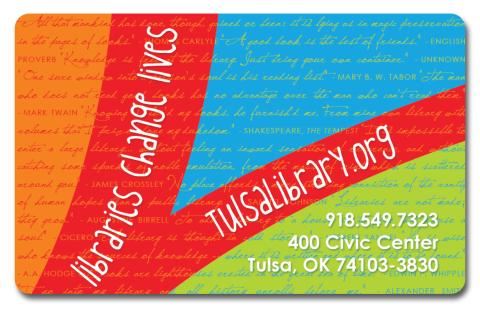
March 2018
Plant a seed, watch it grow. The idea seems simple enough. But wilted dreams of the best planned gardens are far too common in Oklahoma’s extreme temperatures.
To help grow more green thumbs and encourage healthier lifestyles, Tulsa City-County Library began the Seed Library in 2014, http://guides.tulsalibrary.org/tulsaseedlibrary. Customers can check out up to five packets of vegetable, herb or flower seeds per season that are best adapted for our area. If the plants are successful, growers are encouraged to let the best plants go to seed. Then they can the collect, dry, label and return the seeds to the library so the cycle will continue the following year.
Seed Library locations include these Tulsa City-County Libraries as well as the Bookmobile:
· Bixby Library, 20 E. Breckenridge
· Hardesty Regional Library, 8316 E. 93rd St.
· Martin Regional Library, 2601 S. Garnett Road
· Glenpool Library, 730 E. 141st St.
· Nathan Hale Library, 6038 E. 23rd St.
· Suburban Acres Library, 4606 N. Garrison
· Central Library, 400 Civic Center
· Zarrow Regional Library, 2224 W. 51st
Librarians have prepared helpful information on the process of growing and storing seeds, guides.tulsalibrary.org/tulsaseedlibrary. This webpage features a comprehensive listing of all seeds ready for check out, along with planting instructions, seed saving basics and care. You can even check out a packet online and have it delivered to your community library.
The Seed Library is divided into three levels of saving difficulty.
· Easy: Beans, peas, lettuce, eggplant, and tomato. These seeds generally self-pollinate, and are easiest to harvest.
· Medium: Arugula, basil, cilantro, chives, nasturtium and peppers. These may self-pollinate or cross-pollinate and should be separated from other varieties by distance.
· Advanced: Broccoli, cabbage, corn, carrot, kale, okra, squash and Swiss chard. These plants are insect or wind-pollinated and cross with other varieties. To get true seeds separate varieties by time, distance or physical barriers.
With names like Cherokee Purple Tomatoes, Rattlesnake Green Beans and Cosmic Purple Carrots, all ages will enjoy watching these edible wonders reach for the sun. It’s also a fun activity for families to observe the daily changes in their garden, especially as vegetables ripen and become the next healthy snack.
The beauty of growing flowers as a home for butterflies is another great benefit of the Seed Library. By planting Asclepias tuberosa, or the Butterfly Milkweed, flowerbeds will be a welcoming zone for butterflies like the Monarch, whose numbers are declining from lack of habitat.
So this spring, visit a Seed Library and discover an activity your family will truly dig.
# # #